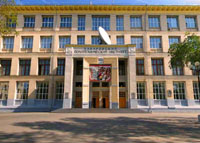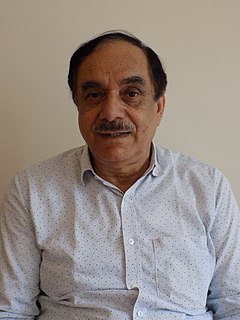Related Research Articles

The Association for Information Science and Technology (ASIS&T) is a nonprofit membership organization for information professionals that sponsors an annual conference as well as several serial publications, including the Journal of the Association for Information Science and Technology (JAsIST). The organization provides administration and communications support for its various divisions, known as special-interest groups or SIGs; provides administration for geographically defined chapters; connects job seekers with potential employers; and provides organizational support for continuing education programs for information professionals.
The Naval Physical and Oceanographic Laboratory or NPOL is a laboratory of the Defence Research and Development Organisation (DRDO), under the Ministry of Defence, India. It is situated in Thrikkakara, Kochi, Kerala. NPOL is responsible for the Research & Development of sonar systems, technologies for underwater surveillance, study of ocean environment and underwater materials.
CSA was a division of Cambridge Information Group and provider of online databases, based in Bethesda, Maryland before merging with ProQuest of Ann Arbor, Michigan in 2007. CSA hosted databases of abstracts and developed taxonomic indexing of scholarly articles. These databases were hosted on the CSA Illumina platform and were available alongside add-on products like CSA Illustrata. The company produced numerous bibliographic databases in different fields of the arts and humanities, natural and social sciences, and technology. Thus, coverage included materials science, environmental sciences and pollution management, biological sciences, aquatic sciences and fisheries, biotechnology, engineering, computer science, sociology, linguistics, and other areas.
Laser Science and Technology Centre (LASTEC) is a laboratory of the Defence Research & Development Organization (DRDO). Located in Delhi, it is the main DRDO lab involved in the development of Lasers and related technologies. LASTEC functions under the DRDO Directorate of Electronics & Computer Science.
Vasudev Kalkunte Aatre is an Indian scientist and former head of the Defence Research and Development Organisation (DRDO), India's premier Defence research and development organization. In that capacity, he also served as the Scientific Advisor to the Defence Minister. He is a recipient of the Padma Vibhushan award.
The Proof and Experimental Establishment (PXE) is an Indian defence laboratory of the Defence Research and Development Organisation (DRDO). Located in Balasore, Orissa, India. its main purpose concerns the research and development of technologies and products in the area of medium and large caliber weapons and their ammunition. PXE is organised under the Armament and Combat Engineering Cluster of DRDO.
The Naval Science and Technological Laboratory (NSTL) is an Indian defence laboratory of the Defence Research and Development Organisation (DRDO), located in Visakhapatnam. Its main function is the research and development of underwater weapons and associated systems. NSTL is organized under DRDO's Directorate of Naval R&D. The present director of NSTL is Dr Y. Sreenivas Rao, Outstanding Scientist and Director General(DG) is Dr. Sameer V. Kamath, Distinguished Scientist.
Defence Research & Development Establishment (DRDE) is an Indian defence laboratory of the Defence Research and Development Organisation (DRDO). Located in Gwalior, it is primarily involved in the research and development of detection and protection against toxic chemical and biological agents. DRDE is organised under the Life Sciences Directorate of DRDO. The present director of DRDE is Dr. Devendra Kumar Dubey.

Foster Edward Mohrhardt was a United States librarian. He had a long and illustrious career in library and information science as a scholar, organizer and diplomat, and was listed by American Libraries among "100 Leaders we had in the 20th Century". Mohrhardt is also known for his work to have the United States Department of Agriculture Library re-designated as a national library.

The Pacific National University (PNU) is a public university in Khabarovsk, Russia. Established in 1958, PNU has over 21,000 students in 54 academic majors.

Iranian Research Institute for Information Science and Technology (IRANDOC) is an Iranian research center with a national mission to meet the country's needs in the field of information science and technology.
V. S. Mahalingam is a distinguished DRDO scientist and Director of Centre for Artificial Intelligence and Robotics. He is an alumnus of Chennai's College of Engineering, Guindy.
Vallampadugai Srinivasa Raghavan Arunachalam is an Indian scientist. He is the founder and Chairman of CSTEP, a science and technology think tank.
Prahlada is an Indian missile scientist, former vice chancellor of Defence Institute of Advanced Technology and a former director of Defence Research and Development Laboratory, the largest of the Defence Research and Development Organization laboratories in India, known for his contributions to Indian space programme. He was honoured by the Government of India in 2015 with Padma Shri, the fourth highest Indian civilian award.
N. Prabhakar is an Indian scientist and the Chief Controller, System Analysis and Modelling Centre (SAM-C) of the Defence Research and Development Organization (DRDO). He graduated in Electrical and Electronics Engineering (BE) from Annamalai University and enrolled at the Indian Institute of Science, Bengaluru from where he obtained his master's degree (ME). He pursued his research at Shanmugha Arts, Science, Technology & Research Academy, secured a doctoral degree in Air Defence Systems and joined the Defence Research and Development Laboratory (DRDL) in 1980.

Ramadas Panemangalore Shenoy was an Indian defence scientist and writer, known for his contributions in the field of Radar technology. He secured a doctoral degree in Electrical Engineering from the University of Wisconsin–Madison and joined Defence Research and Development Organization in 1961, involving himself with the indigenous development of Radar technology till his retirement, as a Distinguished Scientist, in 1989.
Defence Research & Development Service (DRDS) is a Central Group 'A' Civil Service of the Government of India. DRDS scientists are Gazetted defence-civilian officers under the Ministry of Defence. They are responsible for developing new technologies and military hardware for the Indian defence and security forces.
DRDO Young Scientist Laboratories (DYSLs) are five specialised research laboratories located in five different cities of India, inaugurated by the Prime Minister of India on 2 January 2020. Each laboratory deals with a focused area of science - artificial intelligence, quantum technologies, cognitive technologies, asymmetric technologies and smart materials. The labs are located in Bengaluru, Mumbai, Chennai, Kolkata and Hyderabad. As per the norms laid out, everyone, including director, at the labs is under 35 years of age. DRDO Chairman G.Satheesh Reddy conveyed to The Hindu on 3 January 2020 that the laboratories are formally operational.
The High Speed Low Drag (HSLD) bomb is a family of new generation short range air-dropped precision-guided munition that is currently being developed by India's Defence Research and Development Organisation (DRDO). This general-purpose bomb is made for the Indian Air Force (IAF) and can be used against the destruction of strategic high value enemy infrastructure from stand-off distances. HSLD is comparable to Mark 80 series of bombs used by United States Air Force (USAF).

Harsh Vardhan Batra is an Indian scientist working in animal biotechnology at the Department of Biotechnology (DBT), of the Indian Ministry of Science and Technology. He is a former director of the Defence Food Research Laboratory (DFRL), a Defence Research and Development Organisation (DRDO) establishment at Mysore. As a specialist in infectious diseases, he participated in the DRDO biodefence preparedness program, and was an expert member of the technical advisory committee on plague constituted by the government of India in September 1994. He served as technical consultant for the design and construction of high containment laboratories for DRDO, the Indian Council for Agricultural Research (ICAR) and Indian Council of Medical Research (ICMR). He participated in the United Nations Biological Weapons Convention (BTWC) ad hoc group meetings in Geneva as a member of the Indian delegation, and conducted World Health Organization (WHO) Southeast Asia Regional Office meetings and workshops on infectious diseases.
References
- ↑
- ↑ V. Senthil, A.L. Moorthy, Online Access to DRDO Periodicals using Open Source Software [ permanent dead link ].
- ↑ DESIDOC Training Programmes conducted